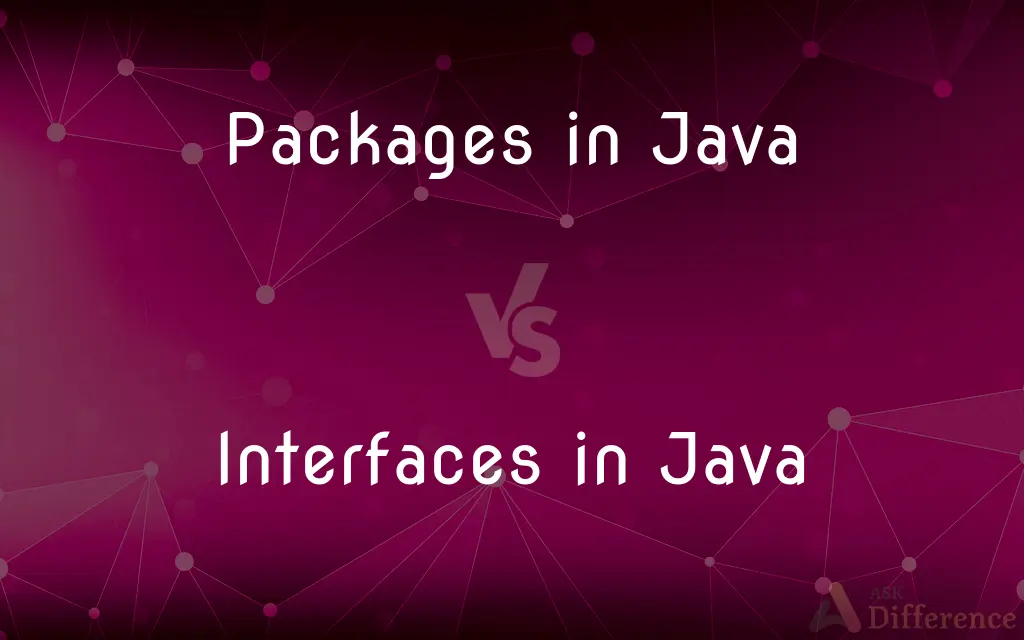Packages in Java vs. Interfaces in Java — What's the Difference?
By Tayyaba Rehman — Published on January 5, 2024
'Packages in Java' organize classes and interfaces, grouping related components. 'Interfaces in Java' define contracts for classes, specifying methods they must implement, promoting multiple inheritances.

Difference Between Packages in Java and Interfaces in Java
Table of Contents
ADVERTISEMENT
Key Differences
Packages in Java act as containers to organize classes, interfaces, and other packages, facilitating better organization, reducing naming conflicts, and enhancing code reusability. They enable access control through their visibility modifiers and provide a namespace to avoid naming collisions.
Interfaces in Java declare a set of methods that a class must implement, defining a contract or behavior without any implementation details. They allow multiple inheritances, enabling classes to implement multiple interfaces, promoting code abstraction and flexibility.
Java packages serve as a way to encapsulate classes and interfaces, offering a modular structure to manage code hierarchies and dependencies. They aid in organizing codebases, simplifying maintenance, and enhancing code readability.
On the other hand, Java interfaces act as blueprints, defining methods that must be implemented by classes that implement those interfaces. They ensure consistency in method signatures across different classes and enable polymorphic behavior.
In Java, packages primarily focus on structuring and organizing code, enabling developers to group related classes and interfaces, which aids in code management and project structuring.
ADVERTISEMENT
Contrarily, interfaces in Java emphasize defining a contract or protocol that classes must adhere to, enabling classes to exhibit similar behaviors despite having different implementations.
Comparison Chart
Purpose
Organizes classes, interfaces, and resources
Defines contracts for classes, specifies methods
Functionality
Facilitates code organization and reusability
Promotes multiple inheritances, enables polymorphism
Implementation
Contains actual code implementations
Declares method signatures and contracts without implementations
Usage
Enhances code management and structure
Enables standardized behaviors across diverse classes, promoting consistency
Focus
Structural hierarchy and namespace management
Method signature definitions and promoting polymorphic behavior
Compare with Definitions
Packages in Java
Enhances code modularity.
The 'java.io' package manages input-output operations.
Interfaces in Java
Promotes code abstraction.
The 'Comparator' interface offers methods for custom object comparison.
Packages in Java
Aids in namespace management.
The 'java.time' package offers classes for handling dates and times.
Interfaces in Java
Defines method contracts for classes.
The 'Serializable' interface mandates methods for object serialization.
Packages in Java
Prevents naming conflicts.
Using different packages avoids clashes between class names.
Interfaces in Java
Ensures method consistency.
The 'Iterable' interface provides methods for iterating over collections.
Packages in Java
Containers organizing related classes.
The 'java.util' package includes utility classes like ArrayList.
Interfaces in Java
Allows polymorphic behavior.
Implementing 'Cloneable' interface enables object cloning capabilities.
Packages in Java
Facilitates code organization.
The 'java.lang' package contains fundamental classes like String.
Interfaces in Java
Enables multiple inheritances.
The 'Runnable' interface allows classes to define a run() method.
Common Curiosities
Can packages be nested within each other?
Yes, Java supports hierarchical package structures.
Can classes belong to multiple packages?
No, a class can only belong to one package in Java.
Do packages affect access control?
Yes, packages control access via their visibility modifiers.
Can interfaces contain constructors?
No, interfaces cannot have constructors in Java.
Can a class implement multiple interfaces?
Yes, Java allows a class to implement multiple interfaces.
Can an interface extend multiple interfaces?
Yes, Java interfaces support multiple inheritance.
Can different packages share the same name?
Yes, packages from different hierarchies can share the same name.
Can packages have sub-packages?
Yes, packages can have sub-packages for further organization.
Can a class exist without being part of a package?
Technically, yes, but it's recommended to have classes in a package for better organization.
Can interfaces have private methods?
Yes, starting from Java 9, interfaces can have private methods.
Can interfaces have method implementations?
No, interfaces declare method signatures but do not provide implementations.
Can packages import classes from other packages?
Yes, Java's import statement allows classes from other packages to be used.
Can an interface have variables?
Yes, interfaces can declare constants which are implicitly public, static, and final.
Can an interface inherit from a class?
No, interfaces cannot extend classes, but they can extend other interfaces.
Can packages contain other resources besides classes?
Yes, packages can contain interfaces, enums, and other sub-packages, among other resources.
Share Your Discovery

Previous Comparison
Unilocular Sporangia vs. Plurilocular Sporangia
Next Comparison
Fatty Acid Synthesis vs. Beta OxidationAuthor Spotlight
Written by
Tayyaba RehmanTayyaba Rehman is a distinguished writer, currently serving as a primary contributor to askdifference.com. As a researcher in semantics and etymology, Tayyaba's passion for the complexity of languages and their distinctions has found a perfect home on the platform. Tayyaba delves into the intricacies of language, distinguishing between commonly confused words and phrases, thereby providing clarity for readers worldwide.
















































